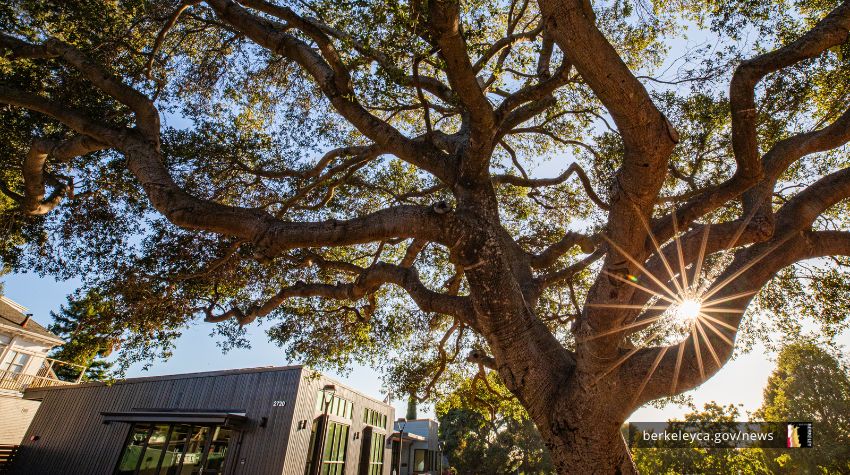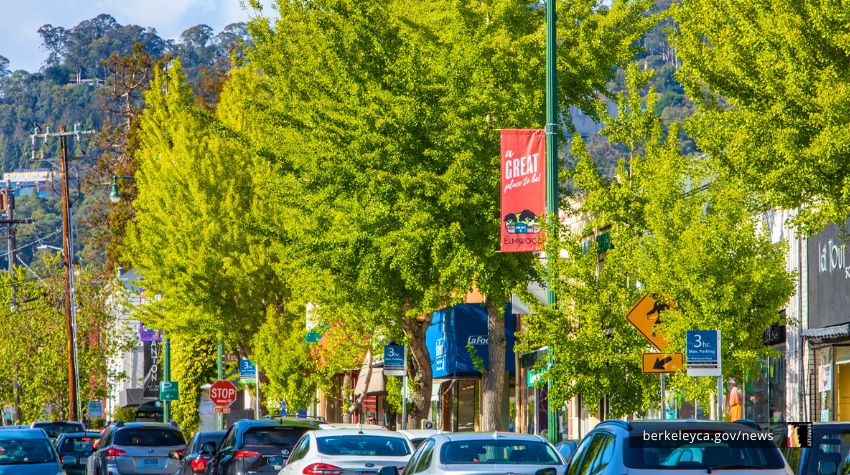Green Building Requirements
Berkeley has several green building requirements that need to be considered during the design phase for new buildings and major additions.
Berkeley’s green building requirements are helping reduce our community’s dependence on fossil-fuels and create healthier, more resilient buildings. They are designed to transition our community to carbon-free building materials and operation, with requirements for renewable energy and efficient use of energy, water, and building materials.
LEED Gold certification
Applies to: New buildings and additions of more than 20,000 square feet in the C-DMU (Downtown Mixed Use) Zoning District
All new buildings and additions of more than 20,000 square feet in the Downtown Mixed Use Zoning District must obtain a LEED Gold or a GreenPoint Rated Silver certification or higher. Read the full text of the law in BMC 23.204.130(G).
solar PV systems (Effective 2023)
Applies to: All new buildings
Most new buildings, both residential and non-residential, must install solar photovoltaic (PV) energy systems at time of construction, subject to limited, specific exceptions. Read the full text of the law in BMC 19.36.
BATTERY/ENERGY STORAGE SYSTEMS (Effective 2023)
Applies to: All new buildings
New single-family and duplex homes must include specific electrical interconnection equipment and/or panelboard sizing and space to be ready for the future installation of battery storage systems, also called energy storage systems (ESS).
New non-residential buildings must have a battery storage system installed, along with the required solar PV system, at the time of construction, subject to limited, specific exceptions. Read the full text of the law in BMC 19.36.
electric readiness (Effective 2023)
Applies to: Additions to single-family homes, duplexes, or townhomes
Gas or propane water heaters installed to serve an addition to a single-family home, duplex, or townhome must designate a space suitable for the future installation of a heat pump water heater (HPWH). A dedicated circuit must also be provided. Read the full text of the law in BMC 19.36.
Electric Vehicle (EV) charging (Effective 2023)
Applies to: All new buildings
Single Family Homes, Duplexes, and Townhomes
- At least one parking space per dwelling unit with on-site parking must be equipped with raceway, wiring, and load capacity to support a future Level 2 EV charging station
Multifamily Buildings and Hotels/Motels
- 10% of parking spaces must be installed with Level 2 EV charging stations (40 amp minimum)
- 40% of parking spaces must be EV Ready, equipped with low power Level 2 EV charging receptacles (20 amp minimum)
Non-Residential Buildings
- 10% of parking spaces must have Level 2 charging stations and/or DC Fast Charge stations installed; at least one Level 2 stations must be provided
- 20% of parking spaces must be EV Capable, equipped with raceway, electrical panel service capacity, and an electrical system to support future Level 2 EV charging stations (40 amp minimum)
Read the full text of the law in BMC 19.37. Accessibility requirements for EV charging stations apply to buildings with public access.
Low carbon concrete
Applies to: All construction projects subject to CALGreen
Construction projects are required to reduce amount of cement used in concrete by at least 25%. Low-carbon replacements for cement include fly ash, slag, silica fume, or rice hull ash. Some exceptions apply. Read the full text of the law in BMC 19.37.
Waste diversion
Applies to:
- All nonresidential projects
- Residential additions, alterations valued over $100,000, and demolitions valued over $3,000
Construction projects meeting the criteria above must recycle or salvage for reuse:
- 100% of excavated soil and land-clearing debris
- 100% of concrete
- 100% of asphalt
- Minimum of 65% of the nonhazardous construction and demolition waste
Read the full text of the law in BMC 19.37.
Water efficient landscaping requirements
Applies to:
- New construction projects with a total landscape area greater than 500 square feet
- Rehabilitations of existing landscape with a total landscape area greater than 2,500 square feet
Projects with a new landscape area of 500 square feet or greater, and renovations with a landscape area of 2,500 square feet or greater, are required to comply with:
- State of California’s Water Efficient Landscaping Ordinance (WELO)
- EBMUD Section 31: Water Efficiency Requirements and WELO Compliance
- Bay-Friendly Basics Landscape Checklist
Learn more about the State of California’s Water Efficient Landscaping Ordinance (WELO) and EBMUD’s Section 31.
CALIFORNIA ENERGY DESIGN ASSISTANCE (CEDA) PROGRAM
Applies to: All new construction and major alterations for commercial, public, multifamily (4 stories or more), industrial, and agricultural buildings
Although not required, qualifying projects are encouraged to participate in the California Energy Design Assistance (CEDA) Program to benefit from free energy design assistance, financial incentives, and operational energy savings. Program application must occur while a project (new construction or major alteration) is in early design phases.
Learn more and apply at CEDA. The online CEDA Screening Tool can provide a quick estimate of incentives and energy savings.
Permit Application Documentation
Berkeley’s requirements extend the California State Green Building Code (CALGreen). Document your compliance by submitting the appropriate checklists below with your building permit application:
News


